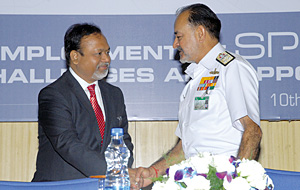INDIAN ARMED FORCES CHIEFS ON OUR RELENTLESS AND FOCUSED PUBLISHING EFFORTS

The insightful articles, inspiring narrations and analytical perspectives presented by the Editorial Team, establish an alluring connect with the reader. My compliments and best wishes to SP Guide Publications.

"Over the past 60 years, the growth of SP Guide Publications has mirrored the rising stature of Indian Navy. Its well-researched and informative magazines on Defence and Aerospace sector have served to shape an educated opinion of our military personnel, policy makers and the public alike. I wish SP's Publication team continued success, fair winds and following seas in all future endeavour!"

Since, its inception in 1964, SP Guide Publications has consistently demonstrated commitment to high-quality journalism in the aerospace and defence sectors, earning a well-deserved reputation as Asia's largest media house in this domain. I wish SP Guide Publications continued success in its pursuit of excellence.
- Appointments Committee of Cabinet approves one-month extension in service of Chief of the Army Staff
- Admiral Dinesh K. Tripathi assumes Command of the Indian Navy as 26th Chief of the Naval Staff
- Prime Minister witnesses 'Bharat Shakti' – a Tri-Services Firing and Manoeuvre Exercise in Pokhran, Rajasthan
- Interim Defence Budget 2024-25 — An Analysis
- Union Defence budget 2024
- Prime Minister Modi Commemorates Indian Navy Day in a Grand Ceremony
National policy on Special Forces imperative: Seminar

A national vision with regard to deploying the Special Forces in the country is imperative and the Indian model had to be its own. This was the outcome of the two-day seminar on “Employment of Special Forces: Challenges and Opportunities for the Future”, organised jointly by SP Guide Publications and the Centre for Joint Warfare Studies (CENJOWS) in Delhi.
Special Forces experts from within the country and outside who participated were categorical that terror threats in India were on the rise and the model to deal with such asymmetric threats had to be totally “home-grown” with learnings from other countries.
The Chief of Air Staff, Air Chief Marshal P.V. Naik underlined the urgency of strengthening the Special Forces as asymmetric warfare by transnational elements were on the rise. Both the political and military leadership had to understand that there would be “fewer wars and more conflicts” and only a well-trained and thinking force could deal with such threats. He called for a national vision with regard to deploying the 10,000 plus Special Forces in the country.
The effectiveness of the Special Forces would depend on detailed intelligence, intimate command and control, mobility and counter-mobility, survivability and excellent communication network. Planning is as important as execution. Calling for integrated joint operations base of the tri-services, the Air Chief opined that once decided there has to be extensive training. “Special Forces capabilities cannot be built overnight, political will can be.”
Vice Admiral D.K. Joshi, Chief of the Integrated Defence Staff to the Chairman Chiefs of Staff Commitees, said the overriding requirement of Special Forces would be interoperability and above all a mindset to overcome overwhelming odds. They have to have a junoon (fanatical kind of mindset) to serve in the Special Forces branch. The force has to be “lean and hungry”, fleet-footed and above all dynamic.
Experts from the UK, Germany, France and Israel gave insight into how the Special Forces operated in their countries, while all of them endorsed that India had to have its own model of Special Forces based on its requirements. Brigadier General Eyal Eizenberg, Commander, Gaza Division, Israel Defence Forces, said the need to understand the behavioural pattern of the enemy helped substantially in countering terrorism. The Special Forces in Israel were trained in this. However, he said that the difficulty in defining the enemy from the crowd had increased, hence the need to have a thinking force. Nowadays, it was easy to buy arms without any difficulty and one of the routes has been the Internet.
Colonel Landicheff Philiippe of the French Air Force said it was difficult to control information as the terrorists used different modes such as Internet, satellite phones, etc. The use of Special Forces was a politico-military decision and the latter should impress upon the political leadership as and when to deploy the forces.
Lt. Gen (Retd) P.C. Katoch, former Director General Information Systems, Indian Army, talked about how cross-border terrorism was State-sponsored and needed to be dealt with firmly. He also mentioned of the nexus between terrorists across the border, the Somali pirates and the LTTE and their movements should not only be monitored but also curbed.
Lt. Gen (Retd) H.S. Lidder, former Chief of Integrated Defence Staff; Air Marshal L.K. Malhotra, Deputy Chief of Integrated Defence Staff (Operations); Maj Gen (Retd) O.P. Sabharwal, former GOC, 6 Mountain Division, Indian Army; Air Commodore Rajesh Isser, Principal Director, Operations (Helicopters), Indian Air Force; Vice Admiral Shekar Sinha, Deputy Chief of Integrated Defence Staff; Commodore R.S. Dhankhar, Principal Director of Special Operations & Diving, Indian Navy, were among the speakers who underscored how Special Forces would play a key role in determining fourth generation warfare. Bharat Karnad of the Centre for Policy Research, New Delhi, recommended establishment of a Special Forces Command and encouragment from higher authorities is essential to boost the morale of the personnel.
Lt. Gen (Retd) A.S. Kalkat, Director Emeritus, CENJOWS and Maj Gen (Retd) K.B. Kapoor, Director, CENJOWS, said the recommendations from the seminar would be submitted to the government as to strengthen the internal security environment.





